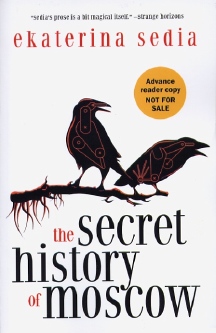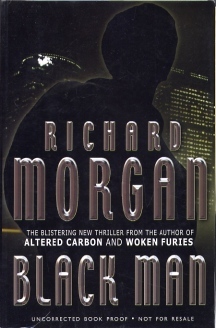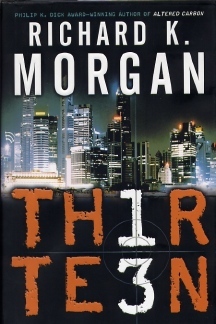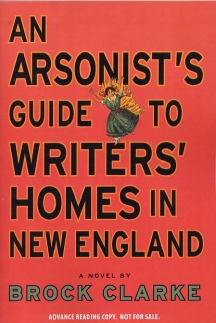|
|
|
|
This Just In...News
From The Agony Column
|
| |
|
07-28-07: Preview for Podcast of Monday, July 30, 2007 : Wake up and smell
the burning flesh.
Here's an MP3
preview of the Monday July 30, 2007 podcast for The Agony Column.
Enjoy!
|
| |
|
07-27-07: Alan Campbell Visits 'Lye Street'
|
Pity the Avenging Angel
|
|
Interior
Illustration by Bob Eggleton for Alan Campbell's 'Lye Street'.
|
Presumably, you've read 'Scar Night', Alan Campbell's debut fantasy that
arrived as a hardcover last summer in the UK and last winter in the US.
The UK mass-market paperback came out in May, and the US paperback is
due in November.
I presume most of my readers have read this because, well, it's that
kind of book. A fantasy with lots of horror elements, and a baroque sensibility
reminiscent of China Miéville. Yes, it is the beginning of a series – The
Deepgate Codex Trilogy – but at least we know it's starting out as
a trilogy and hell, it's damn good, so why kvetch if there's more to come.
Frankly, what’s there is both quite good enough and just obscure
enough to make me want more. I don’t want all my questions answered
in the first book of a series, thank you very much. Campbell has a way
of creating a world that seems larger than the reader can totally comprehend.
To me this is an essential element of an enjoyable fantasy or science fiction
novel. I like not knowing everything. It gives the work a sense of realism.
Still, I also like to know more. So the arrival of 'Lye Street' (Subterranean
Press ; January 2008 ; $25) is excellent news. 'Lye Street' is a prequel
to 'Scar Night', so that those who missed 'Scar Night' can pick up this
reasonably priced deluxe hardcover novella, which tops out at 135 pages,
and see if they like the world and if so, continue forth into 'Scar Night'.
Those who have already visited Deepgate, with its angels and horrors and
Dickensian characters, will be glad for another exploration of this seamy
and gritty environment.
Carnival, Deepgate's angel, has apparently never been a happy girl. She's
been tasked with murdering one Bucklestrappe descendent every fifty years
for over five hundred years. Not too tough a pace, but it does involve
leaving cryptic messages written on walls predicting the death of the next
victim. And, you know, crumpling the body, stuffing it in a drainpipe,
or just leaving it in an alleyway. A grimy alleyway, as this is Deepgate.
So when Carnival herself starts getting messages inviting her to Lye Street,
well, after ignoring them for as long as possible, she finally gets peeved.
It seems that the latest Bucklestrappe heir, one Sal Greene, has hired
someone {something} to stop her. This can't be good for anyone involved.
Well, except any reader who enjoys baroque, weird, violent fantasy – I
do believe that describes my mental state, much of the time. And because
this is a Subterranean Press book, there's always a, "wait, there's
more".
Let's start with the currently invisible but presumably (I'm particularly
presumptuous today) excellent cover by Dave "Sandman" McKean.
Given the whole "not done yet" part, I can't show you that. What
I can show you from the ARC is a sample of one of the many, many interior
illustrations by no less than Bob Eggleton. One wonders, at times, what
Dickens himself might have written with an artistic muse such as Eggleton.
Or indeed, what Eggleton might do were he to be hired to illustrate a new
set of Dickens' work. We certainly need not wonder what he'd do with Campbell's
work – it's right here and quite glorious. This is a very nice little
book by an excellent new(ish) writer at a great price. These Subterranean
Press sell out sooner rather than later. Don’t presume it will always
be around.
|
| |
|
07-26-07: Brock Clarke Offers 'An Arsonist's Guide to Writers' Homes in New England'
|
Ooops
Sorry about that. Really sorry.
Sam Pulsifer, the narrator of Brock Clarke's 'An Arsonist's Guide to Writers'
Homes in New England' (Algonquin / Workman ; September 4, 2007 ; $23.95)
is indeed very, very sorry. That little fire, the one that burned down
the Emily Dickenson house in Amherst, Massachusetts, he didn't mean for
it to kill those two people upstairs. He didn't even mean to start the
fire. It was all a very unfortunate accident.
But there it is. Burn down the house of a famous American literary icon,
accident or not, and lots of people will hate you. A lot. Fortunately for
Sam, most of those of the mail he gets is "scholarly hate mail – the
sad literary allusions, the refusal to use contractions," which he
is able to ignore. And of course there are his fans, who send him, "minor
variations on the "Burn, baby, burn" theme. The fact that the
world was full of kooks wasn't any bigger news than the fact that the world
was full of bores."
Brock Clarke is certainly not among the latter. 'An Arsonist's Guide to
Writers' Homes in New England' is a triumph of voice, a wonderfully understated
and fairly kooky look at fact and fiction, literature and family. Sam tries,
tries, tires to be a good person. Ten years in the hoosegow. Graduate from
high school – finally! Graduate from college, check. Job, marriage,
kids, check.
And still he ends up at his parents' house again, after all that, just
like after he made his retreat from jail. Jobless, separated from his wife,
living with hardcase Mom and weepy Dad. Oh the humanity.
Humanity, of course, is ever the devil's disciple, and is clearly not finished
with Sam. While he's back, back in town, back at the bottom, more writers'
houses start going up in flames, and all eyes turn to Sam. And before you
can say you see it coming, he's got the find the real arsonist.
Clarke is a very clever writer, who doesn't linger or mess around. Sam
tells his story with economy and a mordant wit that will make the people
around you wonder why you're smiling at this book so much. But 'An Arsonist's
Guide to Writers' Homes in New England' is not just all smirk. Clarke's
economic storytelling style lets him dig deeper into the more painful areas
of life. Sometimes you might laugh, other times you might join Sam in a "Why
is this world so fucked up?" fug. As a mystery, the 'Guide' keeps
a brisk pace. As a work of literary fiction, well – it is about burning
down writers' homes, so there is a literary component to the story. A weird,
oddball and potentially off-putting component for some readers. But nobody
is actually saying that one should burn down writers' houses. Just that,
were it to happen, somebody who got all caught up in the roiling set of
attendant problems might have a very interesting and yes, literary story
to tell. And for all that the 'Guide' is indeed a guide, and a very good
book in its own right, I'm recommending that you leave it at home should
you visit any writer's house. You know. Accidents happen, right?
|
| |
|
07-25-07: Ekaterina Sedia Knows 'The Secret History of Moscow'
|
Bear, Rat, Vision
 |
|
| A
clockwork bird – or two. |
We all live in our own secret cities. Our lives are filled with visions.
Oh, they may be mundane, but they are transformative as well. The shadow
cast by a tree you see every morning driving to work, turning the corner
from your street, that looks like a dragon. The florescent bulb in the
bookstore that flickers only when you walk underneath it. The stranger
you see in the parking lot, to whom you say hello every day. Your personal,
secret experience of the world you live, those things you see on a regular
basis that form your world. Your visions.
Ekaterina Sedia knows what those sort of visions are all about, how they
penetrate your consciousness in a manner that is transient yet indelible.
'The Secret History of Moscow' (Prime ; November 2007 ; $12.95) evokes
those visions in a city that to many seems itself a vision. The novel begins
as Galina, prone to visions more explicit, more disturbing, mourns her
life and burns her fingers to keep her doubts at bay. Galina is the girl
who never got married, the defective older daughter just out of a mental
hospital. Her younger sister, Gasha, is pregnant, normal, headed down a
path that Galina's mother knows Galina will never tread.
Until Gasha turns into a jackdaw and flies away, leaving the baby behind.
Or is it yet another of Galina's hallucinations? It's the early 90's, Moscow
is a hodgepodge of new and old, a swarming stew of the supernatural that
most cannot see. Galina can see it all, and having been drugged and hospitalized
once, she's reluctant to talk about it. Still, when your sister turns into
a bird and leaves behind a baby, something must be done. A journey must
be undertaken.
'The Secret History of Moscow' is itself a wonderful stew of unfamiliar
places and even more unfamiliar places, to wit, those that exist in the
liminal world we know exits but simply cannot connect to. Sedia writes
prose that begs to be read; pick up this book and you'll find yourself
drawn in almost if it exudes the sort of magic it portrays too well. Her
characters simply step into your life, no introduction needed. Indeed,
as you might suspect in a book that unearths archetypes and the hidden
structures behind the world. Readers who enjoy Clive Barker's and Neil
Gaiman's hidden worlds will find a lot to love here. Sedia's supernatural
is as effortless as her equally weird and unfamiliar portrait of Moscow.
The combination of the strange and the stranger is a potent one. Sedia
invests her characters with an authority that makes the oddball goings-on
seem inevitable.
She also builds in some unforgettable scenes of the fantastic. Her world
is the perfect combination of the mundane and the magical. Using the familiar
building-blocks of everyday things and mixing them up into new and unnatural
forms, creating something new from what in retrospect sounds like a natural
recombination of the old, Sedia sculpts a world that's rich, clear and
chock-a-black with charming strangeness. Prime Books has struck pay dirt
with this one; don’t be surprised if it ends up on a lot of ballots
and whatnot-lists, none of which matter a whit. Line up for this one, order
in advance and any super-duper copies that Prime cares to print. Order
three; one to loan, one to keep and one for your reading experience. Only
your reading experience matters, and 'The Secret History of Moscow' by
Ekaterina Sedia is an experience you'll not easily either duplicate or
forget. Your secret world. Filled with visions.
|
| |
|
07-24-07: A Review of Richard Morgan's 'Black Man' / 'Thirteen'
|
Prose Conquers All

|
 |
UK
(left) and US (right) versions of Morgan's new novel. |
When I first heard about 'Black Man' / 'Thirteen' by Richard Morgan, it
was from the author himself at the 2005 WorldCon in Glasgow. He certainly
made it sound interesting, but as the book itself arrived, I was a bit
worried as to whether he could pull off everything he had talked about.
The fact that is was being re-titled and re-positioned for the American
audience didn't do anything to assuage my fears.
Fortunately, those fears were indeed laid to rest by actually reading
the novel. From the evocative, schilling and disorienting opening passage
to
the fitting finale, Morgan's writing is superb. Moreover, Morgan has learned
to relax a bit and the more relaxed pacing makes the world he creates seem
more realistic and vivid, even though some portions could easily veer into
caricature. You can read
my entire review here, the bottom line is that
this is Morgan's best work yet. I do mention in the review that I read
the UK version. A friend who read the US version found herself saddled
with a hardcover that literally disintegrated. Given this experience, I
might suggest that you pick up the UK version to read, the US version to
get signed when he's on tour – right now – and an additional
UK HC to fill out your collection. And, no, you can't buy any of my extra
copies of 'Altered Carbon'.
|
| |
|
07-23-07: A 2007 Interview With Faith Popcorn
|
"I think people should be a lot more worried about what seems to be the obvious projection."
|
|
From
her website. Warning,
flash site.
|
Just a little over a year ago, I
spoke with James P. Othmer, author of
'The Futurist',
a lacerating look at the business of marketing, advertising and professional
futurology. To prep for the interview, I decided, on
a lark to see if I could call up Faith Popcorn, the most famous actual
futurist who did get a brief mention in Othmer's novel. In works like
'The Popcorn Report' and 'EVEolution', Popcorn has helped define the
future literally, coining terms like "cocooning" and "ergonomics".
This year, I decided to interview Popcorn herself, who is a formidable
presence even over an ISDN connection. It was an odd interview for me.
I drove into San Francisco at 5 AM, arrived just before 7 AM and was
talking to Popcorn in New York shortly thereafter. And I must say that
she rather threw me for a loop when she started talking about the rooms
that she prepares for her clients.
"Rooms?"
Yes, rooms. In the world of science fiction, there's sort of a tendency
to look down at futurologists as being rather dry. I shared that perception,
thinking that Popcorn simply prepared reports for the Fortune 500 companies
who employed her. But that's not the case at all. In fact, Popcorn had
some very interesting things to say about why she left the world of advertising
and essentially created the marketing trends / futurology biz that she
now runs. She started in advertising, where her boss was unable to pronounce
her given last name, and called her "popcorn". She kept the
name but left the agency because she saw that their answer to their clients
question took one form: the 30-second spot. She thought there might be
more to it than that.
As a futurologist, she espouses virtual reality closets as the place
where we'll spend most of our time in the future. But that's obvious
technology.
What's interesting is that she creates virtual realities and plays now for
her clients, and displays these in rooms with actors and projections.
It all sounds very innovative and quite a bit less dry than the SF world
might presume.
Obviously, the future belongs to the MP3
format of our interview, but
just to be backwards compatible and to purposely dilute my web hit numbers,
I've included the RealAudio
version as well. Popcorn is all about helping
her clients find a way to present their products in a world that is less
and less tolerant of advertising. The day of the 30-second spot is done.
They’re dead Jim, unless you're speaking of my 30-second
preview spots. I can tell you how hard it is cram everything you want to say
in such a little space. But the future, as Popcorn herself says, is open.
Wide open.
|
| |
|
|





